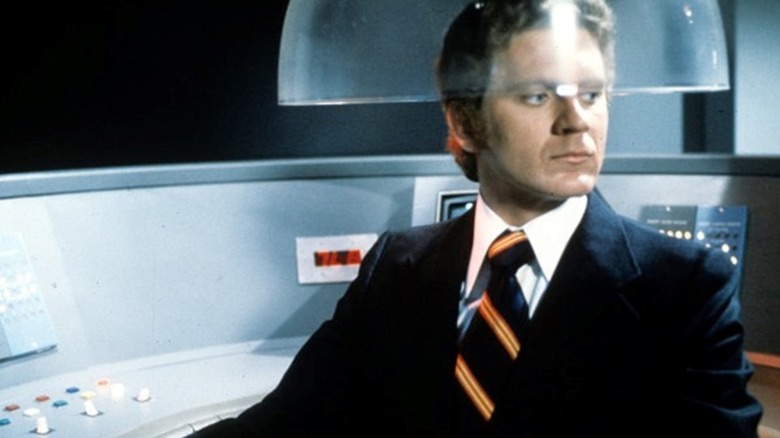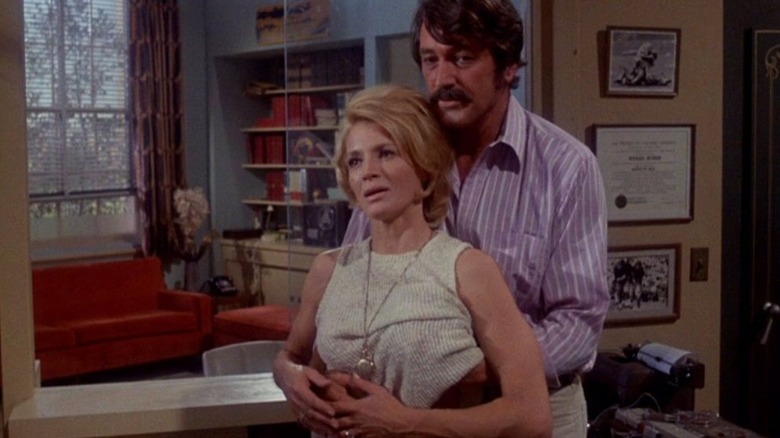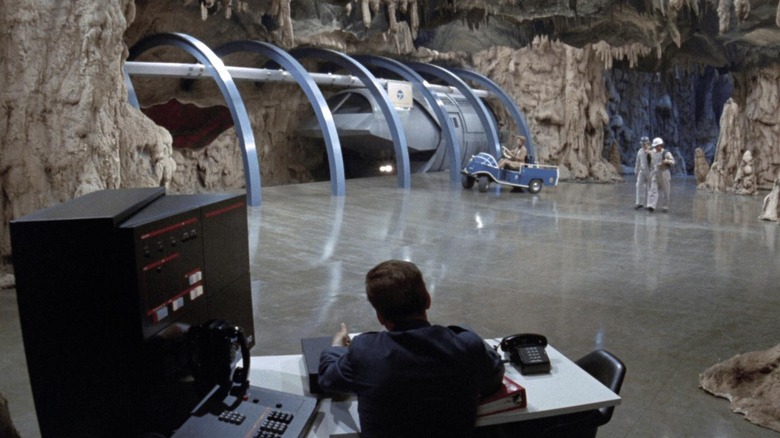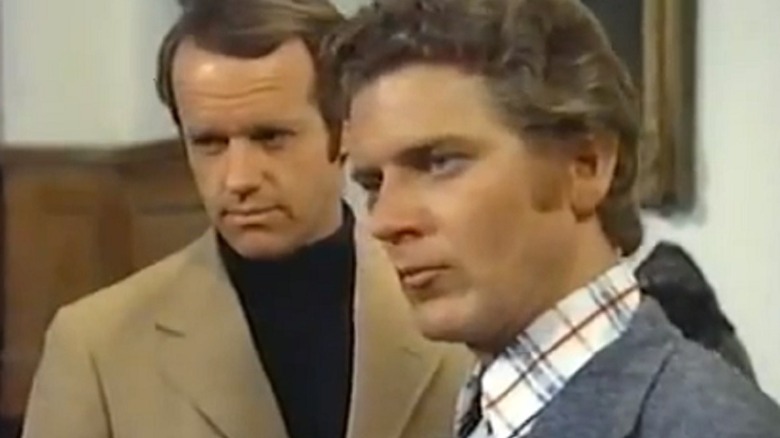Gene Roddenberry Made Nothing But Flops After Star Trek's First Cancellation
Any Trekkie will be able to tell you that "Star Trek" wasn't a big hit in its initial run in 1966. Indeed, the show was all set to be canceled after its second season, and only a well-organized letter-writing campaign rescued "Star Trek" for a third year. Thanks to the gods of syndication, however, "Star Trek" continued to air in reruns for years, and it wasn't until the early 1970s that the series really started to accrue a massive audience. Prior to 1972, "Star Trek" was more or less a scrap of cult television, deeply beloved only by a small (but passionate) audience of science nerds and free-love enthusiasts.
The first large-scale "Star Trek" convention was held in New York at the end of January in 1972, and by then, it was clear that the series had become a phenomenon. Fans gathered to meet actors, discuss technology, and swap merch. "Star Trek" creator Gene Roddenberry frequented large-scale conventions, often discussing his work and philosophy with Trekkies, and really delving into what "Star Trek" meant. It was during these discussions that both Roddenberry and Trekkies really honed in on "Trek" as a piece of utopian fiction, laying out how explicitly anti-war, pro-diversity, and anti-capitalist it was.
Roddenberry also might have surrounded himself with "Star Trek" because none of his other projects from the 1970s were gaining any traction. Roddenberry wrote a few TV shows and one feature film after "Trek" was canceled, and all of them flopped. Only deep-cut Trekkies have likely seen Roddenberry's 1971's sex romp "Pretty Maids All in a Row," 1973's post-apocalypse thriller "Genesis II," or 1974's android detective show "The Questor Tapes."
'Pretty Maids All in a Row'
One might be able to understand why Roger Vadim's "Pretty Maids All in a Row," scripted by Roddenberry, was such a flop. It's a very odd, almost unbearably lascivious serial killer drama that seems to advocate for high school teachers to sleep with their students. Rock Hudson plays the coolest guidance counselor on the planet, doling out advice and charms with sage wisdom and a sparkling wink. He seems to be a decent, married man, but is actually only popular with the female populace of his school because he's bedding most of them.
The Hudson character has recently met the sexy new teacher at his school, a semi-innocent neophyte played by Angie Dickinson, as well as a lanky nerd played by John David Carson. Hudson's obvious solution to help them both is to arrange sexual activity between them.
Oh yes, and Hudson is also a serial killer. He's sleeping with his students, but murders them if they threaten to expose him. Just as much time is devoted to the eventual police sting as to the scenes of sex and buttocks.
The values of "Pretty Maids" seem to be a little twisted. It argues that free love is pretty groovy (something Roddenberry was very open about; he was engaged in a long-term polyamorous relationship with two women), but also punishes the women who engage in it, at least with the wrong man. Critics hated the movie when it was released, but it would eventually gain an audience on the cult circuit. In 2012, Quentin Tarantino listed "Pretty Maids" as one of the best movies of all time when polled by Sight & Sound.
'Genesis II'
1973's "Genesis II" was intended to be a TV pilot, but was rejected and repurposed as a TV movie (a common practice). "Genesis II" starred Alex Cord as an astronaut who is testing a brand-new form of suspended animation, intended for long-term space flights. While testing the sleep pod, however, there is a massive earthquake, and he remains trapped in hypersleep until the year 2133. There's no doubt that the makers of "Futurama" saw "Genesis II" in 1973, as the premise is pretty similar.
Cord awakens to find the world has moved underground following World War III. The survivors have split into factions, with Cord being awakened by PAX, a peace-loving hippie commune made up of the descendants of the NASA workers Cord once knew. Standing opposed to PAX are the Tyranians, a race of nuclear mutants who seek to dominate the world militarily. Cord has to fight the encroaching mutant armies himself, as PAX refuses to take any violent actions. Eventually, Cord will be welcomed into the fold of PAX, but only if he promises to never kill again.
Roddenberry's most popular ideas are all over "Genesis II." Even in "Star Trek," Roddenberry argued that humanity wouldn't be able to reach a post-war utopia unless it nearly wiped itself out first. Our "low point" as a species was still ahead of us, he argued, but beyond that, a great healing will begin. In both "Genesis II" and "Star Trek," the future will be devoted to peace. "Genesis II," however, took place before rebuilding could occur.
'The Questor Tapes'
1973's "The Questor Tapes" was a much more fascinating failed pilot, although one can see how it might be a tough sell. Robert Foxworth played Questor, an android who was constructed under bizarre circumstances. It seems that a brilliant robotic engineer left behind instructions on how to build a high-tech android, but only left pieces of instructions to certain groups. This was to assure that no single team of engineers was privy to the secrets of android-building. The inventor also left behind programming tapes that, thanks to an accident, were partially erased.
The engineers built the android anyway, and give him the programming tapes which have been bowdlerized by new programming. When the android, Questor, awakens, he goes on the lam and finds he must locate his maker, or else a nuclear bomb secretly hidden in his abdomen will explode (!). Questor, one might note, is very much like Data on "Star Trek: The Next Generation." He is naive and emotionless, but interested in humanity. Both Questor and Data, when presented with a potential sexual situation, announce that they are "fully functional."
The big twist at the end of "The Questor Tapes" is that Questor's inventor was also an android. Indeed, androids have been living among humans for millennia, placed there by a mysterious race called the Masters, and tasked with overseeing humanity and guiding them to peace.
Again, themes of worldwide pacifism are baked into the "Questor" premise, with a pinch of Jack Kirby's "Eternals" thrown in for good measure. Roddenberry abandoned his show when the studio made too many changes without his permission. The series never came to fruition as a result.
One can now see why Roddenberry wanted so much reign over "Next Generation." He wanted something that he could control, and that contained his unadulterated ideas. Luckily, that series was finally a hit.



